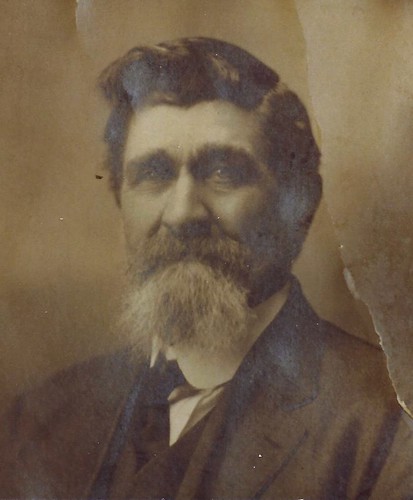
By Bertha Cragun: Granddaughter: deceased: From her records
Joseph Rich Porter came to the valley of Porterville as a young man of eighteen. Within a year he became the first school teacher. He shared this responsibility with a young woman, Anna Wood for two years, then she moved away. He was the only teacher many of the children from the Canyon Creek district ever had. The area encompassed from East Canyon to Richville.
He was one of those early pioneers who exerted influence on the people of Porterville and helped shape their destiny for many years. He tried to instill in his students a desire to do their best, a love of community, country, and church, and a belief in themselves.
He served the people of East Porterville as their Bishop for twenty years, and throughout life filled many church related positions. He was active in the political arena all his adult life. He served as selectman (a Presidential appointment) in the Territory of Utah, County commissioner after Utah became a State, Probate Judge, and Superintendent of Schools. He was elected a member of the State House of Representatives for three different terms, and a chaplain of that body for two years.
He helped organize a debating society, a drama group, and was a trustee of the ZCMI in Morgan. In addition to all this, he farmed 50 acres of fertile land.
His first wife died soon after the birth of their first child, a daughter. Six years later he married Electa Elizabeth Porter. They had eight children.
He was often called J.R. Joseph Rich was born 29 March 1844 in Charleston, Lee County, Iowa. Just two months before J.R.'s birth, Joseph Smith, the spiritual leader-prophet of his family and of The Church of Jesus Christ of Latter Day Saints had been murdered and the entire L.D.S. community was in chaos and distress.
John President Porter and Nancy Rich Porter, his parents were now placed in the ambivalent situation of extreme sadness at the martyrdom of their prophet and the anticipated joy of the arrival of their first child.
Their prophet had been named Joseph and Nancy's father was Joseph Rich. A fitting name for their new son was Joseph Rich Porter.
For this family, as with all the Latter Day Saints, the next two years were filled with turmoil, tremendous sadness, and preparations to go westward to some unknown destination. Yet, too, there were times of infinite spiritual uplift and happiness, brotherly affection and the togetherness that only trouble and persecution will bring about.
In September 1845 the Saints were scattered and persecuted. Many homes were burned and their occupants driven out into the winter cold.
When the Sheriff took a determined stand in favor of the Saints he was arrested and charged with the murder of a mobber. Violence against the "Mormons" was permitted to go unchecked. Governor Ford had promised and pledged his word that the murderers of the Prophet and his brother, Patriarch, Hyrum Smith, would be brought to justice. The citizens of Warsaw, Illinois, where the murders took place, informed the Governor in no uncertain terms that they would not support him. They were to have their own kind of mock court. Similar stand in opposition to the trial of the murders, but expelling the "Mormons" from the state. Governor Ford, by his subsequent actions, acknowledged his inability to handle the situation with fairness and impartiality.
For about a year the people of Nauvoo had been crossing the river into Iowa to escape the persecutions going on in Illinois. Those who could find room took these exiles into their homes, as did some of the Porters, but most of the people camped at a place called Sugar Creek. The weather was inclement and extremely cold, people were without proper shelter, with only wagons or tents to protect them from the elements.
J.R. was three years old when he, his parents, brother Sanford, and most of this extended family began their journey westward.
To be continued
Joseph Rich Porter (J R) is my great grandfather
ReplyDelete